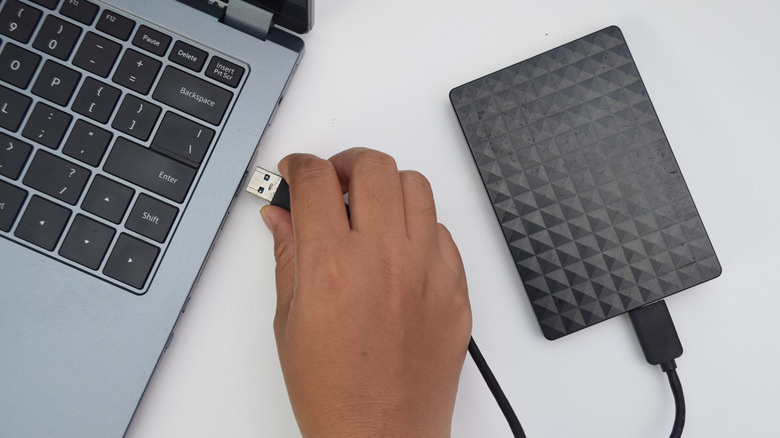Can You Store Bitcoin On A Hard Drive (And Is It Safe)?
Many people have read the terrifying story of a man who threw away millions of dollars of Bitcoin when he accidentally tossed a crypto wallet in the trash. And while that story is true, it is possible to avoid mistakes like that with the right crypto wallet. A crypto wallet can be a type of software — known as a hot wallet — or a USB-like device called a cold wallet. They both hold information about a person's crypto coins, like Bitcoin or Ethereum, or crypto tokens like Uniswap or Tether. A hot wallet is connected to the internet, allowing the crypto owner to manage their assets online. This software can reside on a person's desktop computer, tablet, or smartphone, or through a web-based crypto exchange service. A cold wallet, meanwhile, is a physical device stored away from the internet.
In other words, it is possible to store Bitcoin on a hard drive, though not exactly in the way you might think. Since Bitcoin is a digital asset, a Bitcoin owner wouldn't actually store the assets on a physical device. Instead, they would store their private keys — the complex identification numbers that give them access to their owned assets. And while the fact that a man once threw away his Bitcoin wallet might make you think storing Bitcoin on a physical drive isn't the safest option, cold wallets can actually provide significantly more security than hot ones.
Benefits of a cold crypto wallet
Bitcoin stored in cold wallets is actually protected with higher levels of security than cryptocurrency in hot wallets. Because cold wallets aren't connected online, hackers can't use many of the worst crypto scams to look out for to get personal information from potential victims or find other ways to steal funds. As an example of the crypto scams that cost people huge sums of money, a May 2024 server breach and private key hack led to the loss of $320 million in Bitcoin. This hack occurred on the Japanese cryptocurrency exchange DMM Bitcoin, and involved hot wallet transactions. The company never recovered and ultimately needed to liquidate after the loss.
To keep Bitcoin secure in a cold wallet, plenty of strategies exist outside of not throwing away the drive with your private key information. Take excellent care of the physical devices you use to store your Bitcoin's private key, and make sure the drive is good quality and stored securely. Never share your private key information with anyone else, and only use this device for private key storage. Finally, back up your private key data in secure places offline. The main disadvantage of a cold wallet is that you need to transfer crypto assets to a hot wallet for transactions. So, many security-minded people keep the majority of their Bitcoin in a secure cold wallet, leaving amounts they intend to trade in a hot wallet.

